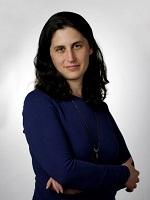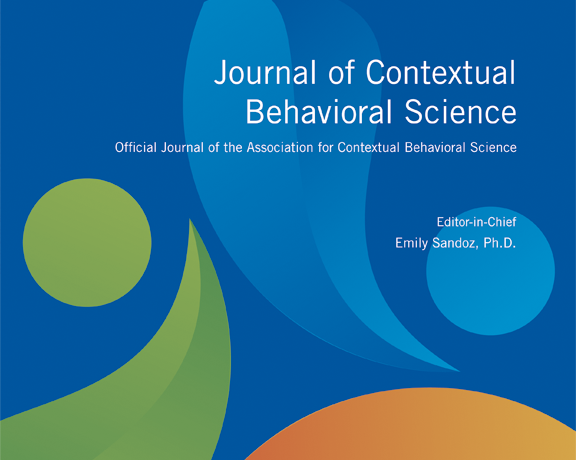2017 #5 Newsletter (October)
2017 #5 Newsletter (October)|
ACBS Newsletter - October 2017
|
|||
ACT Online Peer Supervision Group: Connect Online and Learn from Your Peers
Do you want to learn to become more skilled as an ACT practitioner and gain support from other ACBS members online? The ACT Online Peer Supervision Group is a global forum that aims to provide supervision between colleagues on the experiential practice of ACT in a supported and safe group environment. The ACT Peer Supervision Group meets every two weeks and is hosted by Peer Facilitators. The ACT Online Supervision Group is free to all ACBS members. |
|||
Finding the Door to the CBS House: How a Teacher Discovered ACT and Now Uses CBS in Her Classroom
Lauren Porosoff is a sixth grade school teacher in the Bronx, New York (USA). After discovering ACT five years ago, she has been applying CBS concepts and processes to help students connect their assignments and interactions to their values, and build more satisfying learning experiences and communities. You can read about Lauren's ACT journey here. |
|||
Linguistic Mindfulness at the ACBS World Conference
This summer Jacqulyn Kowalsky joined us in Spain for her first ACBS World Conference. In this article Jacqulyn Kowalsky reflects on her conference experience and provides wonderful insight on how we can improve understanding in international settings. Read the full article on the ACBS website here. |
|||
Adding a Functional Utility Score to the Evaluation of Behavioral Health Screens in Integrated Care Settings: What's All the FUS About?
In JCBS Vol. 6 Issue 2, Alexandros Maragakis and colleagues reflect on current deficits in creating new behavioral health screens for primary care. The paper provides a justification and framework for examining the concept of a "Functional Utility Score" (FUS), which assesses a screen's ability to be useful within its intended system of care. ACBS members can read it for free (or other articles published in the Journal of Contextual Behavioral Science) on the ACBS member portal to JCBS. |
|||
ACBS Fellow James Herbert Inaugurated as President of The University of New England
Congratulations to ACBS Fellow James D. Herbert, Ph.D. for being inaugurated as the new President of the University of New England. Herbert was inaugurated on Saturday, September 9, 2017 at the university's Biddeford, Maine (USA) campus. Herbert was inducted as an ACBS fellow in 2014 and has published several articles in the Journal of Contextual Behavioral Science. |
|||
ACBS Student Spotlight Program: Applications due November 24
The ACBS Student Spotlight Program highlights students who are doing important work in the CBS community, whether for research, clinical, and/or volunteer-humanitarian efforts. This program is a great way to highlight their achievements and let the ACBS community know about important work students are doing. Six students are selected annually. The application deadline is November 24, 2017. Learn more about the program here. |
|||
|
|||
|
Connect. Share. Grow. |
See you in Montréal, Canada, at the July 24-29, 2018. Click here for more information. |
 |
|
|
|
|||
Finding the Door to the CBS House
Finding the Door to the CBS House
By Lauren Porosoff
I joined ACBS kicking and screaming. My husband, Jonathan Weinstein, tried to get me interested, but I said, “This is for psychologists. I’m a middle school teacher.” He told me I was unworkably fused with my content, and I didn’t get the joke.
At the 2012 World Conference in Washington, DC, Jonathan went to talks while I chased our 8-month-old son around the hotel. Eventually I got bored and found the conference bookstore. While many titles had familiar psychology words like “depression” and “anxiety,” others said stuff about values and commitment. I was reluctantly curious.
From my earliest days of teaching, I’ve been trying to help my students find meaning and fulfillment in school. I’m not interested in making students happier. I’m interested in students learning things that matter, to them and in the world. I’m interested in their working hard and being miserable, not because I hate children and revel in their misery, but because any meaningful work will sometimes entail frustration, embarrassment, boredom, worry, and other kinds of pain. What if teachers like me could learn to help students accept those feelings in the service of doing meaningful work and having meaningful relationships at school? What if we could learn to design curriculum and assignments that reflect students’ values?
Maybe there was something to this ACT stuff.
Jonathan told me to learn about basic science and relational frame theory, but they were written in a language I didn’t speak. Even the ACT book, Acceptance and Commitment Therapy, was impenetrable. I felt stupid. But then, I read Russ Harris’s ACT Made Simple. And I understood it! I also read Get Out of Your Mind and Into Your Life and The Joy of Parenting, because they’re written for a lay audience. And I understood them too. When I then tried Acceptance and Commitment Therapy again, I could understand the terms because I had a sense of the underlying processes. I did FoxyLearning and read Learning RFT (and bugged Jonathan with questions about the difference between a discriminative stimulus and an establishing operation), but I didn’t get how a dime being physically smaller than a nickel had anything to do with helping someone with anxiety take her kids to the playground. Then I took one of Matthieu’s courses, and that’s what helped me see the interconnections between ACT (and other therapies) and RFT.
After that, I read everything I could get my hands on, and not only did I understand it; I could see the applications for teaching. Mindfulness for Two could replace “therapist” with “teacher” and “client” with “student” and be about education. Mindfulness & Acceptance in Multicultural Competency is a gold mine for teachers willing to look past the fact that it’s a book for clinicians. I branched out beyond ACT and read The Self and Perspective Taking, Motivational Interviewing, the spectacular CFT Made Simple, and even Relational Frame Theory, the “purple book.”
I like to tell people that I learned CBS upside-down. If CBS is a house, I couldn’t find the door. So I landed on the roof, went down the chimney, and made my way from floor to floor until I discovered the basic behavior science in the basement.
My work has been to apply CBS concepts and processes to help students connect their assignments and interactions to their values, and build more satisfying learning experiences and communities. This work involves “translating” CBS so teachers won’t have to use terms like “self as context” and “transformation of stimulus function.” Some teachers who come to my workshops like to hear about the science, but mostly they want practical tools to help students make school meaningful, in language they already understand. (I imagine some mental health practitioners feel the same way.) So instead of saying “transformation of stimulus function” we say “choosing what school means.” Instead of using basic or even midlevel terms, we use words teachers already know: Exploration, Motivation, Participation, Openness, Willingness, Empathy, Resilience. These terms don’t exactly map onto ACT processes, but they’re more accessible to our audience. Plus, they spell EMPOWER.
EMPOWER is our own little addition to the CBS house, with bricks from MI, CFT, RFT, and ACT. Our wing has a separate entrance for teachers and is a place where they can feel at home. Rather than insisting on compliance with a protocol, we encourage teachers to adapt our activities and strategies so they work in their contexts. We want to honor the diversity among students and subjects, and the creativity and expertise that teachers bring.
Contextual behavioral science had an immediate, profound, and lasting effect on my practice—and almost didn’t. If I weren’t married to Jonathan, if he were a little less persistent, and if we lacked the financial resources to buy all those books and attend conferences, none of our work would exist. I don’t want my story to be some weird anomaly because I happened to marry an ACBS psychologist.
Teachers, physical therapists, occupational therapists, nurses, first responders, clergy, government representatives, nonprofit workers, activists—they’d all benefit from contextual behavioral practices. But they all have their own conferences, their own journals, their own books, their own professional standards, and their own terms that already make sense to them. My experiences have left me wondering how we might welcome a more professionally diverse membership into the CBS house, and support them in developing work to take back to their own houses.
One way ACBS could diversify its membership might be to give new audiences a reason to come to our conferences. We could ask presenters to offer non-therapeutic examples and applications, even when their focus is clinical. We could create a “beyond mental health” track, so people like me have somewhere to go, while encouraging everyone to attend events outside their tracks and see what they end up learning and who they end up talking to. Regional chapters could collaborate with other organizations to offer joint professional events. For example, NY-ACBS and the New York State Association of Independent Schools could team up to offer a workshop for New York teachers and therapists on compassion-focused practice.
But maybe instead of changing what we offer, we want to change how we offer it. What if ACBS clinicians wanted to reach out to people in professions beyond mental health? I’d imagine that you could draw upon your clinical skills to have these conversations. You could:
- Ask us to tell our stories. I get lots of “Wow, you’re a middle school teacher? You must be a saint!” and some “Do you ever think about teaching at the college level?” I hardly ever get, “What did you do in class today?” or “Who are some of your most interesting students?” Get us talking about what matters to us and what obstacles stand in our way.
- Use hierarchical rather than conditional framing to get us curious about new repertoires. In helping professions we often focus on outcomes, such as getting a student to do her homework or a getting a congressional representative to sign a clean energy bill. While of course outcomes are important (sometimes critically so, as in the case of a first responder), we sometimes have narrow repertoires to move toward that outcome. Noticing what kind of life our actions contribute to—as opposed to what they succeed or fail to cause—might help us see new possibilities.
- Work with us on metaphors to help the people we serve. My sixth graders wouldn’t necessarily understand the chessboard metaphor, but they can totally imagine their struggles as food on a plate. In the course of these conversations, you could gently suggest some light reading or viewing: “If that metaphor doesn’t work, there’s this whole book of metaphors I sometimes use. It’s called The Big Book of ACT Metaphors.”
ACBS clinicians can also attend professional events outside the mental health field—sort of like how I attended ACBS as an outsider. Some of my best teaching ideas have come out of ACBS events, not just because I got to listen to brilliant scientists like Louise McHugh and Amy Murrell, but because I had to make my own connections between their work and mine. I recently designed a lesson where 6th graders will use Jonathan Kanter’s ACL case conceptualization to understand the relationship between two characters in the book they’re reading. I wouldn’t have discovered ACL at a workshop for English teachers, and precisely because ACL was designed for clinicians and not teachers, I had to think creatively about how I might use it in class.
Imagine if a few FAP clinicians went to a teaching workshop, or if some ACT psychologists checked out a nursing conference, or if some CFT therapists went to an activist training. Maybe they’d learn something they could creatively apply to their practice—while also meeting new people who might eventually want to come to ACBS. Maybe eventually, more ACBS clinicians and non-clinicians will work together to develop more culturally responsive therapies, and more diverse behavioral interventions beyond therapy.
It’s a collaboration, not a transaction.
Here’s to more collaboration.
Lauren Porosoff teaches sixth grade English at the Ethical Culture Fieldston School in Bronx, New York. She is the author of Curriculum at Your Core: Meaningful Teaching in the Age of Standards and EMPOWER Your Students: Tools to Inspire a Meaningful School Experience.



.jpg)



